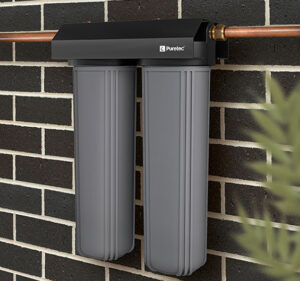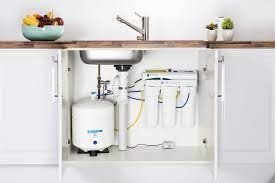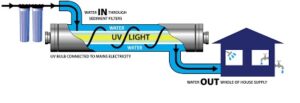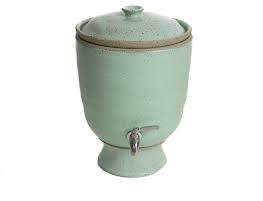Water filters provide numerous benefits including improved taste and odour of the water. Water filters remove contaminants like chlorine, lead, and pesticides, and reduce the risk of waterborne diseases such as giardia and cryptosporidium.

What are the 2 main types of water filters?
There are two main types of water filters:
- Point-of-Use (POU) and
- Point-of-Entry (POE) filters
Point-of-use (POU) filters: These filters are installed directly at the tap or faucet where the water is used. They are designed to treat a small amount of water at a time, making them ideal for filtering drinking and cooking water. Examples of POU filters include countertop filters, faucet-mounted filters, and under-sink filters.
Point-of-entry (POE) filters: These filters are installed at the main water supply of a home or building and treat all the water that enters the premises. They are designed to treat larger volumes of water and are ideal for homes with wells or other sources of untreated water. Examples of POE filters include whole-house filters and sediment filters.
How do water filters work?
Water filters work by using physical, chemical, or biological processes to remove impurities and contaminants from water. The specific process depends on the type of filter and the contaminants it is designed to remove.
- Physical filtration: Physical filters use physical barriers, such as mesh screens or ceramic materials, to trap particles and impurities in the water.
- Chemical filtration: Chemical filters use chemical reactions, such as adsorption or oxidation, to neutralize or remove contaminants in the water. For example, activated carbon filters use adsorption to remove chlorine, pesticides, and other volatile organic compounds (VOCs).
- Biological filtration: Biological filters use microorganisms, such as bacteria or algae, to break down and remove organic contaminants from the water.
Most water filters use a combination of these processes to provide comprehensive filtration and improve the overall quality of the water. The specific process and materials used depend on the type of filter and the contaminants it is designed to remove.
Which type of water filter is best for home?
The best type of water filter for a home depends on several factors such as the source of the water (town water, rural rainwater), the impurities present in the water, and personal preferences. Some popular options include:
Reverse Osmosis (RO) systems.

Reverse osmosis water filter is a type of system that uses a semi-permeable membrane to remove impurities from water. RO systems work by using pressure to force water through the semi-permeable membrane, which removes a wide range of impurities, including dissolved salts, minerals, and other dissolved solids. The purified water is then collected on the other side of the membrane, while the impurities are flushed away.
Reverse osmosis systems are often used in homes and businesses to provide clean, high-quality drinking water, and they are commonly used in combination with activated carbon filters or ultraviolet (UV) filtration to provide a multi-stage filtration process.
Reverse osmosis systems are highly effective in removing impurities, including inorganic compounds, heavy metals, and some chemicals, as well as dissolved salts and minerals. However, they can also remove beneficial minerals from the water, and they require a significant amount of water to flush away the impurities, which can be wasteful in areas with limited water resources.
Reverse osmosis systems are also relatively low-maintenance and can provide a cost-effective solution for removing impurities from the water. However, they can be expensive to install and may require a dedicated water line and drain, as well as regular filter replacements.
Overall, reverse osmosis is an effective water filtration method for removing a wide range of impurities from water, but it may not be the best option for all homes and businesses due to its cost, water usage, and potential for removing beneficial minerals from the water.
Activated Carbon filters.
An activated carbon water filter is a type of water filtration system that uses activated carbon to remove impurities from water. Activated carbon, also known as activated charcoal, is a highly porous material that can adsorb a wide range of impurities, including chemicals, minerals, and dissolved solids.
Activated carbon filters are commonly used in home water filtration systems, including tap-mounted filters, pitcher-style filters, and whole-house filtration systems. They are effective in removing chlorine, volatile organic compounds (VOCs), and some metals and minerals that can affect the taste, odour, and appearance of the house water.
Activated carbon filters are also used in combination with other filtration methods, such as reverse osmosis (RO) or ultraviolet (UV) filtration, to provide a multi-stage filtration process for removing a wider range of impurities from the water.
Activated carbon filters are relatively low-maintenance and provide a cost-effective solution for improving the quality of the water. However, they may need to be replaced periodically to maintain their effectiveness and may not be as effective in removing certain impurities, such as dissolved solids, as other filtration methods.
Overall, activated carbon, filters water and is an effective option for removing impurities from house water and improving its taste, odour, and appearance.
Ultraviolet (UV) systems.

An ultraviolet (UV) water filter is a type of water filtration system that uses ultraviolet light to kill or inactivate harmful microorganisms such as bacteria, viruses, and parasites. These systems work by passing water over a UV lamp that emits a specific wavelength of UV light, which disrupts the genetic material of the microorganisms, rendering them unable to reproduce and causing them to die.
UV water filters are often used as a secondary treatment in addition to other filtration methods such as activated carbon or reverse osmosis to provide additional protection against harmful microorganisms. They are especially useful for homes with well water or other sources of water that are prone to bacterial contamination.
UV water filters are effective in inactivating a wide range of harmful microorganisms, including Escherichia coli (E. coli), Salmonella, and Cryptosporidium. They are also relatively low-maintenance and do not remove any minerals or other impurities from the water, preserving the taste and quality of the water.
Overall, UV water filters are an effective solution for providing clean, safe water by inactivating harmful microorganisms, but they are not effective in removing other types of impurities such as chemicals or dissolved solids.
Sediment Cartridge.
A sediment water filter is a type of water filtration system that removes large particles such as sediment, silt, sand, and other particulate matter from water. These filters are typically installed at the point of entry to a home or building and are designed to protect plumbing and appliances from damage caused by particulate matter in the water.
Sediment filters come in a variety of forms, including cartridge filters, spin-down filters, and sediment backwash filters. They work by physically trapping the particulate matter as the water passes through the filter.
The effectiveness of a sediment filter depends on several factors, including the size of the filter, the size of the particles it is designed to remove, and the flow rate of the water. Cartridge filters, for example, can be easily replaced and are effective in removing larger particulate matter, while backwash filters are designed for larger particle removal and can handle higher flow rates.
Overall, sediment filters are an effective solution for removing particulate matter from water, protecting plumbing and appliances, and improving the overall quality of the water.
Distillation Filter.
Distillation is a process of separating contaminants from water by heating it to boiling point, turning it into steam, and then collecting the steam in a separate container, where it cools down and condenses back into purified water.
Distillation is an effective method for removing a wide range of impurities, including minerals, salts, heavy metals, and microorganisms. However, it’s not as effective for removing certain contaminants such as volatile organic compounds (VOCs) and some dissolved solids.
Distillation filters can be quite effective in providing purified water, but they tend to be more expensive and require more energy compared to other filtration methods. Additionally, the distillation process can also remove beneficial minerals that are naturally present in the water.
Ceramic Filter.

Ceramic filters are a type of water filtration system that use ceramic materials to remove impurities from water. The ceramic material acts as a physical barrier, trapping particles and impurities as the water passes through.
Ceramic filters are commonly used in portable water filters for outdoor activities or in developing countries where access to clean water is limited. They are effective in removing larger particles such as sediment, silt, and sand, as well as some bacteria and viruses.
However, ceramic filters may not be as effective in removing smaller contaminants such as chemicals, minerals, and dissolved solids. Additionally, ceramic filters may need to be cleaned or replaced regularly to maintain their effectiveness.
Overall, ceramic filters can be a cost-effective and reliable option for removing certain impurities from water, but they may not provide the same level of filtration as other more advanced filtration systems.
Water supply: Whole-house filtration systems
A whole-house filtration system is a type of water filtration system that provides clean, filtered water to all the faucets in a home. These systems are typically installed at the main water supply line and filter all the water entering the home, providing clean water for drinking, cooking, showering, and other uses.
Whole-house filtration systems can remove a variety of impurities including chlorine, sediment, dissolved solids, and heavy metals. Some systems also remove bacteria, viruses, and other microorganisms, as well as chemicals such as volatile organic compounds (VOCs).
The specific type of filtration system used in a whole-house filtration system depends on the specific contaminants present in the water. For example, activated carbon filters are commonly used to remove chlorine and VOCs, while reverse osmosis (RO) systems can effectively remove a wide range of contaminants including dissolved solids and minerals.
Whole-house filtration systems can provide clean and safe water for the entire household and are often more convenient than individual faucet-mounted filters or pitcher-style filters. They can also improve the taste and odour of the water, and protect plumbing and appliances from damage caused by impurities in the water.
Whole house water filters will need to be installed by a licensed plumbers. EZI Plumbing has installed many systems and continues to maintain these systems.

7 factors that you need to consider before buying a home water filtration system.
Before purchasing a water filter, there are several factors you should consider in treatment systems:
Type of contaminants: Different water filters are designed to remove different types of contaminants. Some filters are better at removing chemicals, while others are better at removing minerals or microorganisms. It is important to know what type of contaminants are present in your water so that you can choose the most appropriate water filter.
Filtration capacity: Consider the filtration capacity of the water filter and make sure it is appropriate for your household size and water usage. Some filters require frequent replacement, while others have a larger filtration capacity and can last for several months.
Cost: Consider the cost of the water filter, including the cost of the unit itself, as well as the cost of replacement filters and maintenance. Some water filters are more expensive upfront, but may have a lower cost of ownership in the long run due to their high filtration capacity and low maintenance requirements.
Space: Consider the size and design of the water filter and make sure it will fit in the space where you want to use it. Some filters are compact and can be mounted under the sink, while others are larger and may require more space.
Water pressure: Some water filters require a certain level of water pressure to work effectively. Make sure the water filter you choose is compatible with the water supply pressure in your home.
Installation: Consider the installation requirements of the water filter and make sure you have the necessary tools and skills to install it yourself, or that you are willing to hire a professional for the installation.
Maintenance: Consider the maintenance requirements of the water filter, including the frequency and ease of replacement of filters, as well as the overall cleaning and upkeep of the unit.
By considering these factors, you can choose the most appropriate water filter for your needs and ensure that you are getting the best possible water quality for your home.
What is in Australian tap water?
Tap water is often treated with chemicals that can be bad for our health. It can contain high levels of chlorine, fluoride, aluminum, and other chemicals which are added for purification purposes. These chemicals can cause unpleasant tastes and odours as well as being harmful for our bodies.
Some of the most common chemicals found in Australian tap water include chlorine, fluoride, and aluminium. These chemicals are added to the water for a range of purposes and can be harmless in small amounts, but they may be an issue at higher concentrations.
Another chemical commonly found in Australian tap water is lead. Australian Drinking Water Guidelines health limit lead to 0.003 milligrams per litre. Lead in pipes and solder are no longer permitted to be used by licensed plumbers in Australia.


Hi,
I just read your fridge plumbing post and followed up with this one. Both great reads.